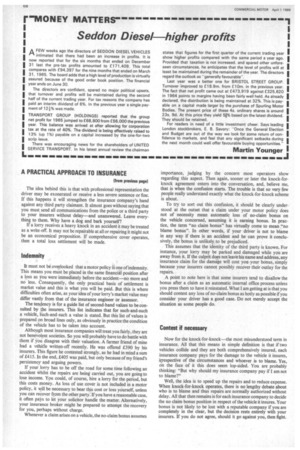A PRACTICAL APPROACH TO INSURANCE
Page 70

If you've noticed an error in this article please click here to report it so we can fix it.
(from previous page) The idea behind this is that with professional representation the driver may be exonerated or receive a less severe sentence or fine. If this happens it will strengthen the insurance company's hand against any third party claimant. It almost goes without saying that you must send all communications from the police or a third party to your insurers without delay—and unanswered. Leave everything to them. Why have a dog and bark yourself? If a lorry receives a heavy knock in an accident it may be treated as a write-off. It may not be repairable at all or repairing it might not be an economical proposition. If comprehensive cover operates, then a total loss settlement will be made.
Indemnity
It must not be overlooked that a motor policy ii one of indemnity. This means you must be placed in the same financial position after a loss as you were immediately before the accident—no more and no less. Consequently, the only practical basis of settlement is market value and this is what you will be paid. But this is where difficulties often arise, as your idea of your lorry's market value may differ vastly from that of the insurance engineer or assessor.
The tendency is for a guide list of second-hand values to be consulted by the insurers. This list indicates that for such-and-such a vehicle, kch-and-such a value is stated. But this list of values is prepared on broad lines only, as obviously in practice the condition of the vehicle has to be taken into account.
Although most insurance companies will treat you fairly, they are not benevolent societies. So you will probably have to do battle with them if You disagree with their valuation. A farmer friend of mine had a vehicle written-off recently. He was offered £390 by his insurers. This figure he contested strongly, as he had in mind a sum of £415. In the end, £405 was paid, but only because of my friend's persistency and arguing powers.
If your lorry has to be off the road for some time following an accident whilst the repairs are being carried out, you are going to lose income. You could, of course, hire a lorry for the period, but this costs money. As loss of use cover is not included in a motor policy, it will be necessary to bear this cost or loss yourself, unless you can recover from the other party. If you have a reasonable case, it often pays to let your solicitor handle the matter. Alternatively, your insurance broker might be prepared to attempt the recovery for you, perhaps without charge.
Whenever a claim arises on a vehicle, the no-claim bonus assumes
importance, judging by the concern most operators show regarding this aspect. Then again, sooner or later the knock-forknock agreement enters into the conversation, and, believe me, that is when the confusion starts. The trouble is that so very few people really understand exactly what the knock-for-knock scheme is about.
To try to sort out this confusion, it should be clearly understood at the outset that a claim under your motor policy does not of necessity mean automatic loss of no-claim bonus on the vehicle concerned, assuming it is earning bonus. In practice, the term "no claim bonus" has virtually come to mean "no blame bonus". In other words, if your driver is not to blame in any way if there is an accident and he can prove it conclusively, the bonus is unlikely to be prejudiced.
This assumes that the identity of the third party is known. For instance, your lorry may be parked and damaged while you are away from it. If the culprit does not leave his name and address, any insurance claim for the damage will cost you your bonus, simply because your insurers cannot possibly recover their outlay for the repairs.
A point to note here is that some insurers tend to disallow the bonus after a claim as an automatic internal office process unless you press them to have it reinstated. What I am getting at is that you should contest any loss of no-claim bonus as hotly as possible if you consider your driver has a good case. Do not merely accept the situation as some people do.
Contest if necessary
Now for the knock-for-knock—the most misunderstood term in insurance. All that this means in simple definition is that if two vehicles collide and they are both comprehensively insured, each insurance company pays for the damage to the vehicle it insures, irrespective of the circumstances and whoever is to blame. Yes, on the face of it this does seem lop-sided. You are probably thinking: "But why should my insurance company pay if I am not to blame?"
Well, the idea is to speed up the repairs and to reduce expense. When knock-for-knock operates, there is no lengthy debate about who is to blame and thus repairs are normally authorized without delay. All that then remains is for each insurance company to decide the no claim bonus position in respect of the vehicle it insures. Your bonus is not likely to be lost with a reputable company if you are completely in the clear, but the decision rests entirely with your insurers. If you do not agree, should it go against you, then fight.




















































































































